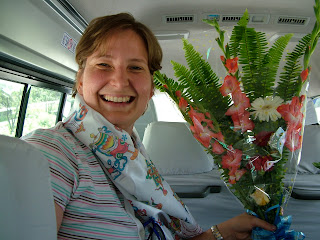Not sure when I first wrote this, or why. I stumbled across it today as I was looking for something else and thought I might as well post it here as it may never see the light of day anywhere else!
He lies there asleep, or pretending, and
she slips in behind him. The earth is warm and so is he. Her body
presses into the curve of his back, the bend of his legs. He smells of
fresh sweat, but clean beneath, the same detergent her mother uses. This
could stop her, the thought of her mother and with that the memory that she
herself is little more than a child, but it doesn’t. Childhood taboos are
no longer strong enough to control the pull of this.
She focuses on the hairs at the back of his
neck, behind where he can’t see and so does not know to shave. If she was
with him, she would run the razor over these hidden hairs for him. These are the type of intimacies her mother
does for her father, a woman for the man she loves. And this is a man, not like the boy-children
at her school with their long legs and awkward movements, soft facial hair,
new, strange body odours; the friends of her childhood still morphing to fit
what will be their adult bodies.
His body tightens as he realises she is there; his skin is still warm, but he is no longer as pliant as he was in his rest. She runs one hand down his arm, like she used to do over the fur of her dog, barely touching him. The movement is meant to soothe, but still she feels the rigidness of his back against her. She rests her hand on him more firmly now, the cord of muscle in his forearm strengthened by his work. She presses around this hard mass of him, curving her palm to fit. She feels the twitch, the quiver of fibres beneath the surface.
His body tightens as he realises she is there; his skin is still warm, but he is no longer as pliant as he was in his rest. She runs one hand down his arm, like she used to do over the fur of her dog, barely touching him. The movement is meant to soothe, but still she feels the rigidness of his back against her. She rests her hand on him more firmly now, the cord of muscle in his forearm strengthened by his work. She presses around this hard mass of him, curving her palm to fit. She feels the twitch, the quiver of fibres beneath the surface.
She moves her face forward and touches her
lips to the back of his neck where the hairs curl. It is too soft for a kiss, merely the
brushing of her skin against his, but immediately she feels the tremor move
through his body. She recognises the shudder
for what it is – two forces colliding, his desire for her and his fear, his
body and his mind. It had been this way
for her too, for a long time. But not
now, last night had cured her indecision.
We
can’t do this, he says, almost a whisper. You’re
too young and I’m too old. She
kisses the back of his neck now, her mouth slightly open, breath hot. We
can’t do this, he says again. This
time he is pleading and she hears the fear in his voice. His fear of her; his fear of her power. She is young and desirable and doesn’t care
about consequences and that is enough to make her dangerous, and irresistible. She knows it.
She moves her hand up his arm, pushing his
sleeve up as she goes until she feels his bicep and then she begins to stroke
that, moving her lips back and forwards against his neck in the same
rhythm. He moans softly and she presses
harder against him, lifting one leg over the top of his. His sigh, when she does that, is deep and
old, resolve leaving, resignation entering; he isn’t nearly strong enough to
oppose her.
He turns to face her and she feels the full
blast of him, male and strength and desire.
Every part of her body is hot now – even where she presses into the
ground, even where the air moves over and under her loose dress, her eyelids
are on fire, her fingers burn, her body is a furnace.
Stroking the hair from her face, he kisses
her. He kisses her and strokes her face
and her arm and her bare leg where it rests against him and she is consumed,
she cannot breathe, her mind is emptied of everything but the feel of him on
her skin. She has nothing against which to judge what she is experiencing, she
only knows what this is not: not her childhood; not restriction; not fear; not banality;
not school; not her parents; not everything she has disliked for years. She has fallen through the heat of his desire
for her to a place she hasn’t been before.
The earth moves to accommodate them; where
her body now presses down with him above her, where the movement of bodies
changes wind flow and casts shadow where before there was sun. The earth moves with them and around them,
protecting them and their actions from being seen or heard, protecting them,
for now, from being discovered.
At the end she sees he is crying; she wipes
away his tears, but she doesn’t feel sorry for him – no-one should feel sorry
for him. He should have known better,
should have feigned sleep, swatted her away like an insect, left the
very next morning; he should have resisted her.
But of course, neither of them knew then where she was taking them. Of what she would do to his life, or
hers.



